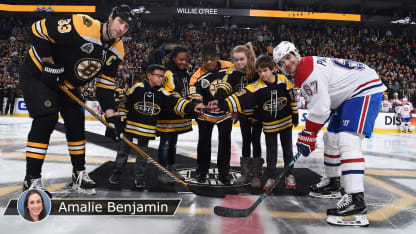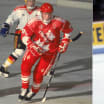BOSTON -- The standing ovation started on the benches of the Boston Bruins and Montreal Canadiens and spread through TD Garden as Willie O'Ree walked out to center ice on Wednesday to drop the ceremonial puck.
It was one day shy of 60 years since O'Ree became the first black player in the National Hockey League, playing for the Bruins against the Canadiens on Jan. 18, 1958 in the Montreal Forum. He would play 45 games in the NHL, and now serves as the Director of Youth Development for the League, where he works with boys and girls and preaches a message of inclusion in hockey.
O'Ree moved by celebrations honoring 60th anniversary of NHL debut
First black player in League continues to preach message of inclusion in hockey


















